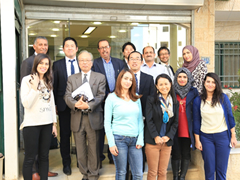Project News
2016-11-21
Mid-Term Review of the Project
 JICA and MoLG staff together after finishing the mid-term evaluation
JICA and MoLG staff together after finishing the mid-term evaluation
From 19th to 21st November 2016, we visited Palestine for the purpose of conducting the Mid-Term Review of the Project for Technical Assistance in Solid Waste Management (SWM).
The purpose of the Mid-Term Review is to verify the relevance of the project for a fixed term from the beginning. It also verifies and analyzes the attainability of the project goal in terms of effectiveness and efficiency, as well as the project's promoting factors and obstacles and their respective trends. The results of the Mid-Term Review are utilized to review project framework and design and they are also used to improve project management.
During the team's stay in Palestine, we visited the NE+SE Jerusalem JSC office and the proposed transfer station site in Jerusalem, and had a series of discussions and exchanged opinions with the members of the Project and the authorities concerned in Palestine. As a result of the review, we evaluated and recommended the following points to the Project.
We do hope that the project members would understand the results, and 7 recommendations raised by the team would be scrutinized among the members and reflected to the project activities for the success of the project.
We will come back next year for the terminal evaluation.
1. Evaluation of the Project Progress
| Output | Result of the Review |
|---|---|
| [Output 1] MoLG's capacity for instruction, support and coordination to JSCs is enhanced through implementing activities with targeted 5 JSCs in SWM. |
On Schedule: OVI.1-3 (Organizing Annual/Basic SWM Plan preparation meeting/workshop for target 5 JSCs) and OVI.1-4 (Making waste flow by Tubas, Qalqiliya and Nablus JSCs) are partly achieved at the moment but on schedule. |
| [Output 2] MoLG's capacity for preparing standards, regulations and guidelines in SWM is enhanced. |
Some OVIs delayed: OVI.2-2 (Preparing draft Manual and guideline on waste source reduction (home composting)) and OVI.2-3 (Preparing recommendation of the standard for C&D waste management) are delayed. |
| [Output 3] MoLG's capacity for preparing national policies and plans in SWM is enhanced. |
Mostly on schedule: OVI.3-3 (Sharing concept for economic instrument and PPP in SWM among MoLG and JSCs) and OVI.3-4 (Preparing procedure guideline for economic instrument and PPP by MoLG) are partly achieved at the moment but mostly on schedule. |
| Output 4 MoLG’s management capacity at organizational level is enhanced. |
One OVI delayed: OVI.4-1(Publishing Newsletter quarterly) is delayed. |
2. Evaluation by Five Criteria
| Five Criteria | Result of the Review |
|---|---|
| 1. Relevance (To what extent is the Project justifiable and/or needed?) |
High: The New SWM Strategy (2017-2022) is awaited, the priority of SWM at MoLG raised after Japan visited and Japan’s priority also high. |
| 2. Effectiveness (To what extent has the Project been effective in producing the intended effects?) |
Relatively High: The Project purpose is likely to be achieved if the delay is recovered. |
| 3. Efficiency (Has the Project been implemented efficiently?) |
Relatively High: Inputs is almost as expected, but the absence of the Project Coordinator generated some confusion to project management . |
| 4. Impact (Has there been any positive/negative long-term effects of the Project?) |
Relatively High: SWM Bylaw will proceed to an approval process and networking among JSCs are strengthened. |
| 5. Sustainability (To what extent will the effects of the Project be sustained after the period of cooperation is completed?) |
Moderate: Human resources at MoLG, financial challenges in subsidy and tariff collection are needed. |
3. Recommendation for the Project
- Sustainability of Human Resources of MoLG, especially greater role of the Counter Parts, stable staffing and new recruitment.
- Ensure sustainable contribution from the Local Expert Team (LET).
- Share successful practices in financial management among JSCs.
- Accelerate donor coordination and mobilize finance.
- Recovery of delays in the Project Activities.
- Early assignment of a long-term Project Coordinator.
- Consider qualitative indicators to measure "sustainable SWM system" and JSC's capacity improvement and performance.
- About JICA
- News & Features
- Countries & Regions
- Our Work
- Thematic Issues
- Types of Assistance
- Partnerships with Other Development Partners
- Climate Change / Environmental and Social Considerations
- Evaluations
- Compliance and Anti-corruption
- Science and Technology Cooperation on Global Issues
- Research
- JICA Development Studies Program / JICA Chair
- Support for the Acceptance of Foreign HRs / Multicultural and Inclusive Community
- Publications
- Investor Relations
